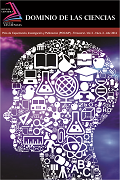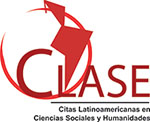Anólisis de un periódico en línea como herramienta para el desarrollo de la motivación profesional en el proceso de enseñanza-aprendizaje de redacción digital para estudiantes de periodismo
DOI:
https://doi.org/10.23857/dc.v2i2.52Palabras clave:
redacción digital, periódico en lÃnea, web 2.0Resumen
La presente investigación cualitativa recopila información sobre los estudiantes de Comunicación Social de la Pontificia Universidad Católica del Ecuador Sede Ibarra, para conocer su comportamiento y la importancia de la redacción digital en su formación. Para esto, se elaboró un periódico en línea, durante el semestre marzo-julio de 2013, con alumnos de segundo nivel en la asignatura de Medios Impresos I. Se analizó el acercamiento a las tecnologías de la información y la comunicación (TIC). Con estudiantes de cuarto nivel, en la asignatura Taller Complementario Periodismo Digital, se elaboró el contenido con base en la redacción en línea y sus principales características, como son: la multimedialidad, la interactividad y la hipertextualidad. La investigación-acción permitió que los alumnos se introduzcan en la redacción en línea y en el mundo digital a través de estrategias de diseño y estructuración de la plataforma web mediante una plantilla de Joomla.
Citas
CIESPAL, 2006. Lo mejor de chasqui, periodismo digital. Quito: Quipus.
DIAZ NOCI, J. y SALAVERRIA, A.R., 2003. Manual de Redacción Ciberperiodística. Barcelona: Ariel.
FALLA, S., 2011. Adictos a la comunicación: guía para periodistas y bloggers independientes. Guatemala: Maestros del Web.
FOGEL, J. y PATIÁO, B., 2007. La Prensa sin Gutemberg. Madrid: Torrelaguna.
GARCIA JIMÉNEZ, A., 2007. Aproximaciones al Periodismo Digital. Madrid: Dykinson.
GUARDERAS, S., 2009. Publicaciones Universidad de Palermo. Disponible en: http://fido.palermo.edu/servicios_dyc/publicacionesdc/vista/detalle_articulo.php?id_libro=138&id_articulo=4630
IRIGARAY, F.; CEBALLOS, D. and MANNA, M., 2010. Periodismo Digital en un paradigma de transición. Rosario: Fundación La Capital.
JARAMILLO, E., 2003. Periodismo Digital. Quito: Quipus.
JARAMILLO, E., 2006. Periodismo Digital, un reto para Amí©rica Latina. Quito: Quipus.
LUJáN, G., 2003. Educomunicación, educación para la comunicación. Loja: Editorial UTPL.
MCLUHAN, M., 1996. Comprender los medios de comunicación. Las extensiones del ser humano. Barcelona: Paidós.
POSSO YÉPEZ, M., 2011. Proyectos, Tesis y Marco Lógico. Quito: Noción.
TIEMPO, E., 1995. Manual de Redacción. Bogotá: Printer Colombia.
BARRETT, J.D.; PETERSON, D.R.; HESTER, K.S.; ROBLEDO, I.C.; DAY, E.A.; HOUGEN, D.P. and MUMFORD, M.D., 2013. Thinking About Applications: Effects on Mental Models and Creative Problem-Solving. Creativity Research Journal, 25(2), 199-212. doi: 10.1080/10400419.2013.783758
BURNETT, C., 2011. Holistic Approaches to Creative Problem Solving. PhD Thesis. Institute for Studies in Education of the University of Toronto.
HERRMANN, D. and FELFE, J., 2013. Moderators of the Relationship Between Leadership Style and Employee Creativity: The Role of Task Novelty and Personal Initiative. Creativity Research Journal, 25(2), 172-181. doi: 10.1080/10400419.2013.783743
HONG, J.-C.; HWANG, M.-Y. and TAI, K.-H., 2013. Applying the BaGua to revitalize the creative problem solving process during a goal oriented contest. Thinking Skills and Creativity, 9(0), 120-128. doi: http://dx.doi.org/10.1016/j.tsc.2012.09.003
HUGHES, D.J.; FURNHAM, A. and BATEY, M., 2013. The structure and personality predictors of self-rated creativity. Thinking Skills and Creativity, 9(0), 76-84. doi: http://dx.doi.org/10.1016/j.tsc.2012.10.001
KAUFMAN, J.C.; PUMACCAHUA, T.T. and HOLT, R.E., 2013. Personality and creativity in realistic, investigative, artistic, social, and enterprising college majors. Personality and Individual Differences, 54(8), 913-917.
MARTINDALE, C., 2007. Creativity, primordial cognition and personality. Personality and Individual Differences, 43, 777-785.
MERROTSY, P., 2013. Tolerance of Ambiguity: A Trait of the Creative Personality? Creativity Research Journal, 25(2), 232-237. doi: 10.1080/10400419.2013.783762
MOLNáR, G., GREIFF, S. and CSAPó, B., 2013. Inductive reasoning, domain specific and complex problem solving: Relations and development. Thinking Skills and Creativity, 9(0), 35-45. doi: http://dx.doi.org/10.1016/j.tsc.2013.03.002
RODRIGUES, C.F.F., 2011. El rendimiento acadí©mico y su relación con el estilo de la personalidad de los estudiantes universitarios. Tesis de Maestría. Universidad federal de Río Grande del Norte.
STANKO-KACZMAREK, M., 2012. The Effect of Intrinsic Motivation on the Affect and Evaluation of the Creative Process Among Fine Arts Students. Creativity Research Journal, 24(4), 304-310. doi: 10.1080/10400419.2012.730003
TIDIKIS, V. and ASH, I.K., 2013. Working in Dyads and Alone: Examining Process Variables in Solving Insight Problems. Creativity Research Journal, 25(2), 189-198. doi: 10.1080/10400419.2013.783745
VELáZQUEZ, á.P.; PÉREZ, M.H. and RODRIGUEZ, Y.A., 2012. Elementos teóricos de la enseñanza problí©mica. Mí©todos y Categorías. Gaceta Mí©dica Espirituana, 14, 34-50.
Descargas
Publicado
Cómo citar
Número
Sección
Licencia
Authors retain copyright and guarantee the Journal the right to be the first publication of the work. These are covered by a Creative Commons (CC BY-NC-ND 4.0) license that allows others to share the work with an acknowledgment of the work authorship and the initial publication in this journal.







